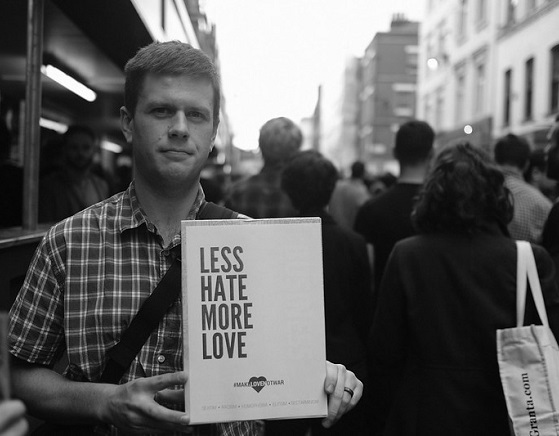Grateful to My Fellow Queer People Who Delve Within.

{source}
To be queer is to orient yourself as Other. It’s to inhabit the space of the foreigner, of the aberration.
It is an uncanny amalgamation, a joining of the polarities creating a fusion that is unusual.
If being queer is willfully wearing this othering, stating that you are queer is to speak from a space at the fringes, a rare place, a place unseen by most. You are a denizen of and communicate from a liminal realm.
To speak the word queer is an invocation, it summons the awareness of otherness into being, to position yourself as speaking from a strange and unknown place, to contain messages from the ether.
For me, reclaiming this word has been an integral part of personal development. It’s given me a way of conveying that I have existed in spaces unseen or seen in distortion, in projection, in schism, and relegated to the taboo shadows of society.
This inherently creates a sense of distancing for both the queer person self-identifying and for the listener participating in the known social space.
It’s an act of personal enclosure, of saying “I am this different kind of person, I have this different kind of experience.”
Perhaps many come to this word and take on its mantle with defiance initially, a rebellious glance at society that wears the outcast’s colors with pride. Eventually I think the word can take on a generously varied gleam in what is an increasingly prismatic outlook. Seeing oneself as an oddity, a strange beauty that shines just outside the areas that are mapped for all to see.
That’s what it’s been for me, “I come from this other place, let me show you what I mean.”
You see, I’ve been the odd one as long as I’ve been an adult, but I wasn’t drawn to those who shared the banner of Other.
Instead, I was the queer one among those engaged in the expected iterations of sexuality and identity. In the world of musicians and other artists; certainly oddities in their own right, but among the cavalcade of eccentrics I trafficked with in my twenties, I was a weird mixture.
My friends have been heterosexual men and women. I seemed to be able to dial in to the frequencies of both women loving men and men loving women in the social world of my youth with ease, more difficult for me was communicating with other queer folk.
I was Cupid or Pan in the periphery, inciting excitement or cheeky intrigue while reveling in the San Francisco hedonism of the early aughts.
Sequestered from danger by an equally maternal and mirthful group of women, a band of roving nymphs that swept through the city as if life was a lark; silvery laughter, the scent of perfume and the flicker of my puckish prance and we’d be gone, on to our next alcove of decadence dancing dangerously close to debauchery.
Men I knew were like a rangy brotherhood, chill met by moonlight, brought to the city to push boundaries and buttons, experienced and experimental, we shared a male bonding of forthrightness and fun. A playfully competitive jocular jubilance shone in these friendships that I cherish to this day.
Among my cohorts my differences shone in delicious delineation, the contrast making my distinctions exquisite. I was the token, but a sparkling one that could grant access to another land that made the recherché romance we all lived more rare.
We all partook of dawn’s violet skies and violet pills like plundering pirates pillaging intensity on the undulating seas of chance. San Francisco was once The City That Knows How, before it became the city that knows how to code.
One thing that I felt early on with striking clarity was my ability to help my friends relate, mediating between men and women and using my own world-straddling perspective as a compass. A live-wire connection between the sexes and tart quips from bourbon-scented rosebud lips.
I paint this period of my life in all its hues to demonstrate the externalized work of union I was undergoing.
The relations of men and women in after-parties that murmured with secrets long forgotten was an outer crucible that I exercised in outsourced alchemy, pulling together the relatedness of men and women reflected the weaving work of masculine and feminine that I had not, could not yet, embark upon internally.
I voyaged in a land of intensity, and as much as my friends employed my innate polarity-merging, I too utilized the company of divine vessels and vassals to outwardly integrate the internal extremes of my being.
Now, in a decade far less decadent but not less dynamic, I see that work as an internal one. Queer existence is less a pouty party trick and more a state of continuous communication, of integration between aspects in the service of a more holistic outlook. Once again though, I see an invitation to share the view.
I see this as a divine calling, one so essential in a time where the sexes seem to be struggling for relatedness, for sharing and understanding, for union.
I see this as a calling that resonates through history and cultures. From the Galli, the priests of Cybele who castrated themselves and partook in ecstatic rites of union with their Near Eastern fertility goddess, to the Two-Spirits of the Native Americans who engaged in intercession in the relations between the sexes and between the mortal and spirit world.
Today however, I find a strange solipsism in Queer Thought. An approach that’s both isolated and demanding of those who aren’t a part of the queer experience.
There seems to be an expectation that the world at large must learn the internal minutia of our process, to know cryptic jargon culled from the recesses of rarified humanities departments. The aggressive enforcement of speech codes that all but inhibit dialogue and prevents a free-flowing sharing of ideas. Queer Theory in many iterations seems to presume that information runs just one way, that instead of being a conversation, it is a lecture.
I danced in both queer and non-queer spaces in my youth, in nightclubs and art spaces where I invoked the androgynous dancing conduits of bygone eras with the beat of music and my two-spirited heart, and even I feel the expectation for me to speak very carefully about my own experience.
Not all the codes in SF are technological, but they have the same exclusionary, graying effect in my view.
Even spaces touting Queer Spirituality seem to me a suffocating, cloistered approach. As if Queer Spirituality is intended only for queer people. As if a queer person’s spirituality, their feeling of union and oneness with the Divine, necessarily excludes. As if being queer isn’t simply another path to Source.
I believe we as queer people have the opportunity to serve people at large as we have for time immemorial. To act as a channel and mediator. I also think this requires a lot of internal work, to step into this space is to delve into overlaid constructs, shadow and shame, and to come out with the desire to connect not disconnect into inculcated groups that reflect a separate spirituality.
We must start with our own internal work, that much seems clear to me and I endeavor to do it continuously. I am glad to see this being brought to the foreground in these spaces.
But I wonder, are we separating ourselves from the Great Work we can do if we believe we are forging a path of Queer Spirituality instead of simply being queer people seeking Source?
Could we as individuals reveal our struggles and share our evolving internal synthesis, thereby being of service to others without such a view? Is it possible that gay culture’s separatist pageantry is infiltrating the way we view our relationship to Self?
My view is colored by not being social or sexual with queer men often in my life, so perhaps the distancing I feel and the disconnect I perceive is innately bound to a perspective that is unusual among the unusual.
Perhaps there is a sense of communal work that requires social incubation more than the dramatic oscillation of externality and internality that has been my experience.
I am grateful that queer people are doing the work to delve within and find their connection to Self. I understand that it must seem easier to do in community.
I only balk at the seeming subset of a separate spirituality, rather than a sense of unity derived from connecting to and integrating a divinely special view.
I would love to see a veering away from the sibylline, sectarian field of vision, and an embrace of how our unique facets can illuminate the collective with varied vistas of masculinity, femininity and desire.
As people on the edges of the known world, perhaps we can be the cartographers of a new fluidity in integration between the poles. Instead of mirroring ourselves in the dividing confines of our niche human experiences, we may forge a new understanding.
As C.G. Jung said, “The Self is a collective idea, which the Hindus call ‘conglomerate soul,’ consisting of many souls – built out of many souls as it were, both masculine and feminine ones.”
Perhaps in this new era of strife and division, we are called not to test others about their knowledge of our inner aspects and identity-signifiers, not to conceal our path from others, but to invite people to witness us and thereby their own diverse dimensions of expression as part of a universal Self where there are no others.
It’s an idea that excites me and has resonated in different levels and stages of my development, and one I aspire to realize within and without.
***

Maren Zweifler enjoys teaching Yoga with a focus on free movement and intrinsic shapes, emphasizing spinal fluidity and innate, primal posture. Deeply inspired by movement systems that embrace nature like Sridaiva and Continuum Movement. He completed a 500 hour certification in SF and has taught both there and in Austin where he honed his skills teaching private classes tailored to the individual needs of his clients. He created a wellness/yoga program at a non-profit. These experiences allowed him to explore both the unique individuation of the physical experience in one-on-one sessions, and the commonalities of the human form that can be witnessed in large groups. You could connect with Maren on Instagram.

